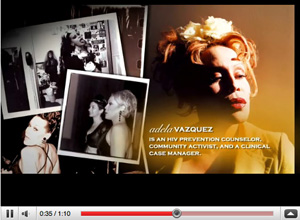| Sun | Mon | Tue | Wed | Thu | Fri | Sat |
|---|---|---|---|---|---|---|
| 1 | 2 | 3 | 4 | 5 | ||
| 6 | 7 | 8 | 9 | 10 | 11 | 12 |
| 13 | 14 | 15 | 16 | 17 | 18 | 19 |
| 20 | 21 | 22 | 23 | 24 | 25 | 26 |
| 27 | 28 | 29 | 30 | 31 |
CATEGORIES
RECENT ENTRIES
BLOG ROLL
Incongruent diagnosis
Does the forthcoming DSM-V mark a shift in how psychiatry thinks about transgender people?
In 2013 the fifth edition of the Diagnostic and Statistical Manual of Mental Disorders (DSM) is scheduled to be published—the first major revision since 1994. When the American Psychological Association released a draft in February, one of the big changes was the shift from "Gender Identity Disorder (GID)" to "Gender Incongruence" as the DSM diagnosis for people who were born one sex but identify as another (male, female, neither, or both).
The name change drew mixed reactions from students and faculty at a May 11 Center for Gender Studies documentary screening and discussion. Some said that any name is better than the stigmatizing burden of "disorder"; others argued that our societal notions of gender create this "incongruence" in the first place. But, as the man sitting in front of me pointed out, "society is fucked up."
The transgender activists in the featured hour-long documentary, Diagnosing Difference, essentially argue that the "disorder" moniker is both unscientific and unfair, that it "doesn't capture the joy that happens" when someone feels comfortable in his own skin for the first time. It makes one's gender identity into a pathology; it can affect a person socially, culturally, even legally. And who is a psychiatrist—who, one of the activists in the movie pointed out, may never have even given a thought to their own gender identity—to tell a person who she should be? But the way our medical system works now, the diagnosis is what gives trans people access to certain hormonal or surgical treatments.
Assistant professor of sociology Kristen Schilt, who researches transgender men in California and Texas, led the discussion. She explained that the GID diagnosis is really important in her Texan subjects' lives: some of their parents threw them out of the house before they knew about the diagnosis, said Schilt. But then, once the subjects could say that they had GID, "it became something real," and the parents could begin to accept it.
Ultimately, argued Schilt, the shift from disorder to incongruence doesn't really change much—the APA's conclusion is still that they know what's better for transgender people than the trans people themselves. That's not saying it'll never change. Homosexuality was removed from the DSM in the 1980s after years of debate, and, she said, "a similar victory will happen eventually with GID." She shrugged and smiled. "Maybe the 2020 edition will see Gender Incongruence fading."
Ruthie Kott, AM'07
May 20, 2010

